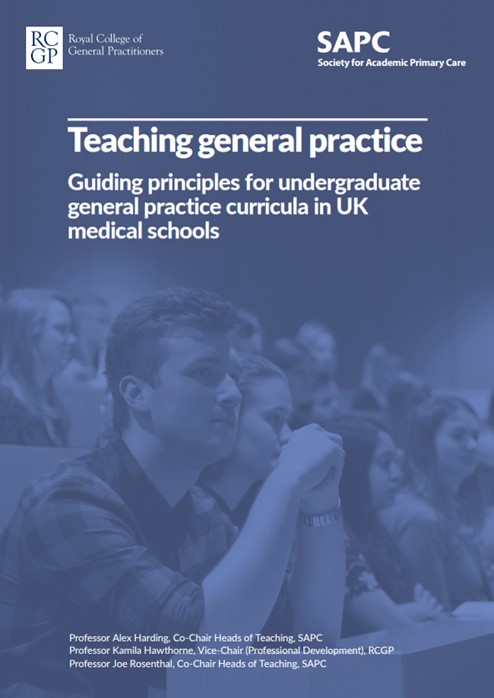The Society for Academic Primary Care (SAPC) and the Royal College of General Practitioners (RCGP) have collaborated to produce, for the first time, national guidance on the design and delivery of general practice learning and teaching in UK medical schools.
The guidance is based on published evidence and current best practice in UK medical schools and has been refined through consultation with the Heads of Teachers group in SAPC, the Medical Schools Council (MSC), the General Medical Council (GMC) and the MRCGP Curriculum Development Group. It aims to support implementation of the recommendations of the recent Health Education England (HEE) and the Medical Schools Council 'By choice - not by chance' report on raising the profile of general practice as an intellectually challenging and vocational career choice to medical students at medical schools.
It does not propose a one-size-fits-all curriculum or syllabus, but rather a set of guiding principles providing ample space for individual undergraduate programmes to adapt and innovate to their own individual circumstances. We recommend that medical schools use this document to inform thinking around the quantity, content and process of general practice teaching, both on placements and on campus. This process should integrate with local medical school curricula and also broader GMC curriculum outcomes.
Foreword from Chair of RCGP Council
“General practice underpins the whole of our National Health Service, making the greatest proportion of patient contacts and providing essential continuity by holding patients' medical records for their life course. Now more than ever we need to promote the expert medical generalist role as we plan for the future. To paraphrase the Chief Executive of NHS England, Simon Stevens, 'there is arguably no more important role in modern Britain than that of the family doctor.'
Medical schools have a responsibility to educate and prepare approximately half of all their graduates for careers in general practice - this guide shows how best to place emphasis on teaching and promoting general practice as a career which is professionally and intellectually rewarding. It has been consciously aligned to the 'By Choice - not by chance' report which was produced by HEE/MSC in 2016, and is a forward-looking document, describing guiding curriculum principles that will take medical students forward into healthcare for the next decade and beyond.
I am delighted that this guidance document is being launched in the year we are celebrating the 70th Anniversary of the NHS. It is the result of a constructive collaboration between colleagues from SAPC and RCGP and a testimony to our shared values and vision for the future education of medical students.”
Professor Helen Stokes-Lampard, Chair of RCGP Council, September 2018
A framework for undergraduate GP teaching
For the purpose of undergraduate learning we define general practice as follows:
General practice comprises the practical and scholarly aspects of delivering highly effective personalised care to individuals, their families and populations in primary care and community settings.
This simple, working definition encompasses three broad areas of enquiry that can be delivered in both university and work-based placement contexts:
- Person-centred care
- Population-centred care
- Efficiency of general practice
These three areas are enlarged upon in the main body of the document, providing guidance on what medical schools should be considering to deliver as part of their general practice teaching, in more detail.
Recommendations
Whilst we believe that each school must have freedom to develop the details of its own general practice curriculum according to local circumstances, we urge all schools to consider the general principles outlined in this guidance. The need to provide sufficient quantity and quality of GP teaching must be addressed in order both to promote general practice as a positive career choice and to ensure that future hospital specialists are equipped to work in an increasingly community-based National Health Service. To this end we conclude with the following five specific recommendations:
- All medical schools should review annually the balance they provide between clinical placements in general practice and in hospital, working towards a goal of delivering a minimum of 25% of their clinical placements in general practice.
- A significant amount of dedicated general practice academic content should be delivered on medical school campus which should also be reinforced on clinical placements. This teaching should communicate the importance of scholarship, a generalist approach to medicine, and the rich research base of general practice.
- General practice teaching should encompass three broad areas of enquiry:
- Person-centred care
- Population-centred care
- Providing care in a highly efficient way in community settings
- General practice teaching, both in practice and on campus, should be provided by a range of GPs with different clinical and academic interests in order to demonstrate the breadth and depth of the discipline.
- All medical school curricula should reflect the recommendations contained within the HEE/MSC 'By choice - not by chance' report on raising the profile of general practice at medical schools.
The full document can be downloaded here



